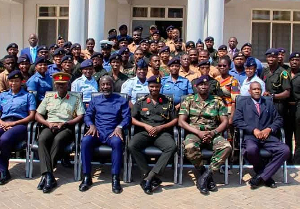Opinions of Sunday, 7 June 2020
Columnist: Sinto Baluri Abdulai
The threatening effects of coronavirus on education in rural areas and opportunities
The world since its inception has been bedeviled with several catastrophes and their attended ramifications. But significant amongst them is the COVID-19 pandemic that knows no boundary.
Indeed, every right thinking individual has an aversion to the destructions caused by this novel disease. Coronavirus, according to the world health organization (WHO), is a cluster of viruses that cause fluid-like disease and currently has no vaccine or any specific cure or treatment protocol as at 5th June, 2020.
The WHO also noted that treatment is based on symptoms. There are several unsubstantiated claims and allegations, in various media outlets, that this canker is a deliberate disease that was designed by the Chinese authorities to achieve an aim that's known to them.
This pandemic, after its explosion in China, has caused a lot of devastations by infecting millions and killing thousands of people. It has also succeeded in halting the grinding wheel of all major sociopolitical and economic activities worldwide. Ghana recorded it first case on the 12th of March, 2020 and its aftermath consequences are a sad reality no one adores.
Going forward respectfully, the matters arising from this pandemic are so pronounced and history would capture it for the unborn generations.
My plea this hot afternoon is to look at the effects of this pandemic on education at the rural areas and the opportunities therein.
The old adage that ‘every coin has two sides’ seems to gain more grounds as it fits very well in the current developments caused by COVID-19 within the educational sector.
Education is the foundation for every country’s development and formal education provide the means for an exponential rate of development to flourish. Sadly, the later has been thwarted by this pandemic especially in the Ghanaian rural communities.
Taking into considerations the infectious nature of the disease, HE President Akufo-Addo in consultation with his Council of Elders and other key stakeholders took a wise decision by swiftly closing all schools to avert the spread of this deadly disease especially among students and teachers.
However, it's quite unfortunate and disgusting for one to note that, this singular act though in good faith has spelt doomed for the future of most students in rural areas especially young girls.
The poverty level of the people at the rural areas is pronounced and most parents find it difficult to shoulder additional responsibilities towards their wards. This is exacerbated by the high prevalence of adolescents’ marriage and teenage pregnancy in these areas.
Since the decision to close all schools, many young girls have fallen victim to these in the rural areas. The opposite might be true if these girls were at school.
The few determined ones who defy all odds to go back to school are also dejected and thrown into dismay per current happenings. In the face of no best option, the government of Ghana has resorted to the online learning system which is a pale version of the conventional system.
Though this is better than none, it only benefits the well to do in society and further impoverished the poor. In the first place, many rural households cannot afford smart phones to start with.
In instance where the few privileged households acquired these devices they are faced with severe network connectivity problems. In some communities people gather at a spot to get glimpses of network to make an ordinary call which doesn't need much network availability. With this situation, the least one talks of internet connectivity the better. I am a living testimony to this and many people can confirm it.
A number of media houses including Joy News and Citi TV have introduced their online lessons for various categories of students. The big question however is, how many students in the rural settings are benefiting from this laudable initiative.
Some communities still live in complete darkness while others who are privilege to be connected to the national grid do not have access to a digital TV set or a TV set with satellite to access these lessons.
Those who are privilege to have them, their wards are mostly in the farms or backyard gardens helping their parents to prepare and till land for the farming season. Poverty indeed is a disease.
The COVID-19 pandemic has created many other developmental challenges that have direct and indirect effect on education in the rural areas. One of such is the draining of resources that would have been allocate for educational infrastructure and supplies to enhance teaching and learning.
The unplanned government expenditure (from borrowing and domestic revenues mobilized) has increased the country’s debt stock hence tightening the finances of government.
This has rippling effects on rural districts that heavily depend on the District Assembly Common Fund (DACF) to fund infrastructural projects at rural areas.
Communities with schools under trees would have to wait a little longer and others with school infrastructure that needed immediate attention to avert them from collapsing of further deteriorating would have to watch on while they continue.
Men of God have always preached that ‘in every unpleasant situation there is good in it, regardless of the pain it may cause you’. Many lessons had the world learned from this new world dictator.
Globally, it has exposed the weaknesses within the social, political and economic infrastructure and systems. It has also affirmed the view that humans are equal irrespective of your race or colour and that the best way to defend is to be supportive to others in need. The outbreak of COVID-19 has also affirmed and vindicated the scriptural provisions of equality and the need to love one another.
Locally, the virus has showcased many developing countries including our beloved Ghana the need to reason domestically. It's disquieting when one sits to imagine how the rich and political elites in Ghana especially those from the rural part behave.
Anytime there is a favorable change of conditions they would neglect the very place they so emanated from and the people who pushed them up the ladder. Most of these people even turn to seek basic health care from outside with the tax payers’ money while failing to develop the Ghanaian health and other sectors.
But with the "Senior COVID-19" pandemic, it has reminded us the need to be right thinkers and prioritise local development over seeking pleasure elsewhere. Even with free visas and air ticket alongside free medical care for the few privileged who fancy everything in the developed world, I guess they will renege to undertake such a journey these days.
Another lesson worth noting is the need to diversify and consume what we produce. Hitherto, simple materials like nose mask, hand sanitizers just to mention but few were all imported.
The Ghanaian love and test for everything foreign has today been exposed through lockdown and closure of borders as a measure to counteract COVID-19.
Talents have been discovered and many opportunities created to the local people.
If these opportunities are well taken with government support, Ghana’s industrialisation derive would sooner than ever dreamt of be realised. Wealth and job creation will be the new norm.
The vices of employment would be brought to the barest minimum if not completely curbed.
The virus outbreak has also awakens the Ghanaian spirit of collectivism and sacrifice for the under privilege. Led by the President, many government appointees and MPs have sacrificed their three months salaries to support the COVID-19 fight.
Also, many other well-meaning Ghanaians have in various ways donated items, cash and physically risking their own safety to fight against the pandemic.
This gesture has been solidified when all politicians across the various political parties are preaching the same protocols though they have their difference in the approach and resource prioritisation.
COVID-19 will surely go, but what is unpredictable is the extent to which it will impact the lives of rural people. These people are predominantly peasant farmers who largely depend on herbal medicine for treating various kinds of sicknesses.
Government should therefore use this opportunity invest heavily in the herbal industry to research onto using herbs to treat viruses such as the novel coronavirus.
This will not only create employment but also reduce over dependence on foreign countries for essential medicines and boost the health systems in Ghana.
With COVID-19 raking the world like a harmattan wildfire, the way to go is domestication.














